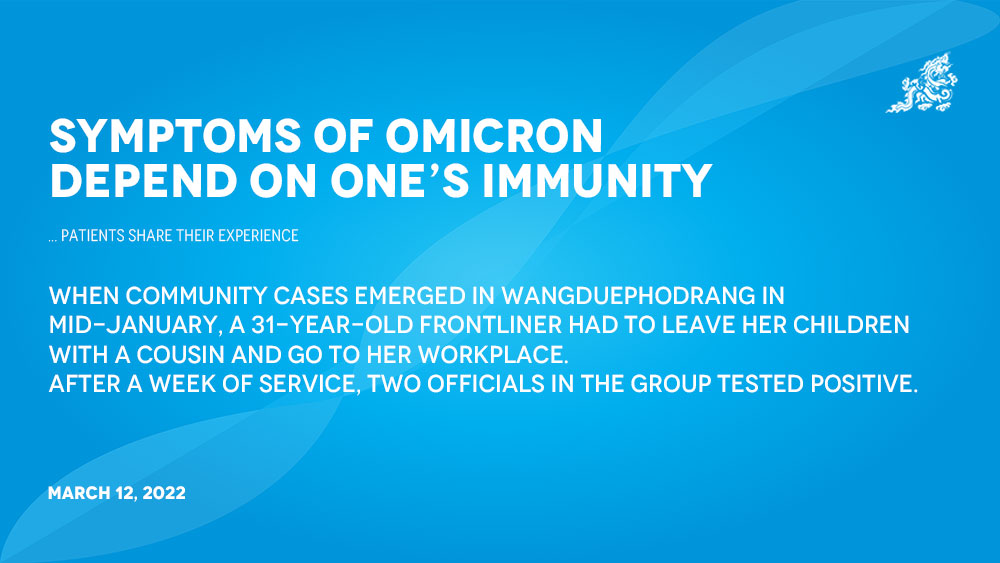… patients share their experience
Tashi Dema
When community cases emerged in Wangduephodrang in mid-January, a 31-year-old frontliner had to leave her children with a cousin and go to her workplace.
After a week of service, two officials in the group tested positive.
The woman and her friends, as primary contacts, were taken to a hotel for quarantine. Five frontliners had to share a room because of shortages of quarantine facility.
As days went by, all her co-workers, who were also roommates, tested positive and were taken to isolation. The close contact of the two officials tested positive first.
“In the meantime, my body ached. I had a dry cough. I was feeling unwell,” she said. “But I did not test positive.”
The frontliner was sick for a week before she finally tested positive.
“Once I tested positive, I worried as people told me it will cause problems in the future,” the mother of two said. “I thought of my children and if I could transmit it to them.”
She said her worries aggravated her condition. “The symptom was like that of a common cold, but with a different pain. It was debilitating.”
The frontliner said she vomited at times when food was bad. “I wish no one ever gets this disease.”
After staying in isolation for nine days, she tested negative and went home. “But I was advised to stay home in a quarantine mode for a week. I kept my children at my cousin’s place even when I was home.”
Doctors advised her to bring her children home only if she was not showing symptoms.
Around the same time, a security guard in Punatsangchu project also tested positive.
The 49-year-old man said he was identified as primary contact after a friend tested positive and was asked to home quarantine.
“When officials came to check after two days, I tested positive and was taken to isolation,” he said. “I just felt like I got a common cold. There were no other symptoms.”
He said more than the virus, taking to hospital in the middle of the night and people in the colony running away made him sad. “I felt ostracised and unhappy.”
In the isolation centre , he said four of them shared the room because of room shortage in the hospital. “All of us were asymptomatic and spent the time chatting.”
Two days after he was taken to isolation, his wife and daughter also tested positive. “They were also asymptomatic like me,” he said.
The family is now back home in Bjimithangka and without any problems. “Many people I know here did not suffer,” the man said.
However, the story is not the same for a 30-year-old driver, who tested positive in Mongar last week.
Ferrying cement from Nganglam to Kurichhu project, Ugyen has been identified as the primary contact of a driver who tested positive in Nganglam.
He tested positive three days after he was quarantined in Mongar. “I got common cold before testing positive,” he said.
According to Ugyen, symptoms and severity of the pain depends on a person’s immunity as nothing happened to many drivers who tested positive. “Two days after I tested positive, I got severe joint pain and headache. I lost my appetite and suffered a lot.”
He said he got severe throat pain and his blood pressure increased. “Since there was no medicine, I just took hot water. It took me a few days to recover.”
Ugyen said another 50-year-old driver, who tested positive, just got diarrhoea. “Nothing happened to him although he is older than me.”
Meanwhile, the 31-year-old frontliner in Wangdue is back on duty.
“Life has to move on. We are doing a 12-hour shift,” she said.
A Punatsangchhu project worker who tested positive said the only problem at the isolation centre was boredom. “I had a fever, but that disappeared after I took some paracetamol,” he said.


